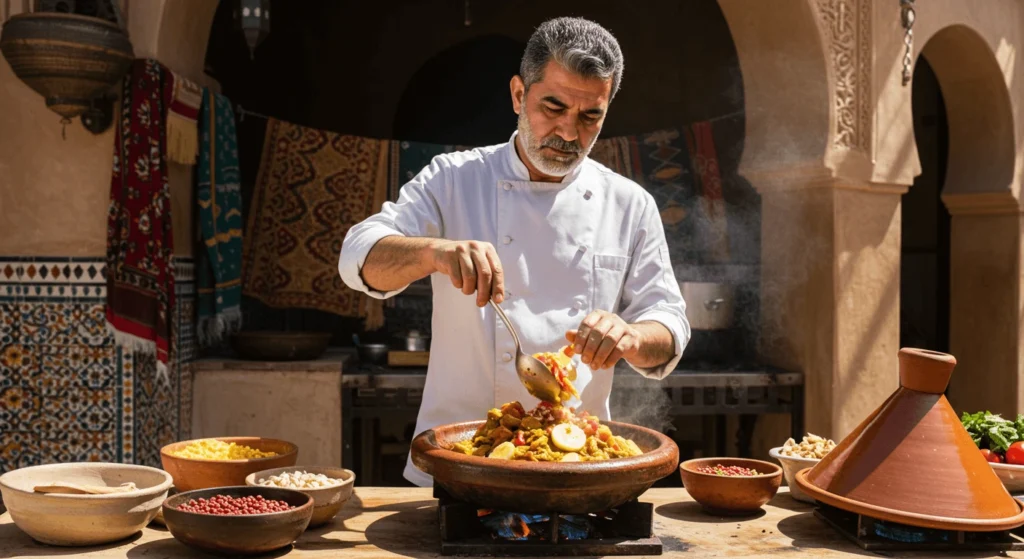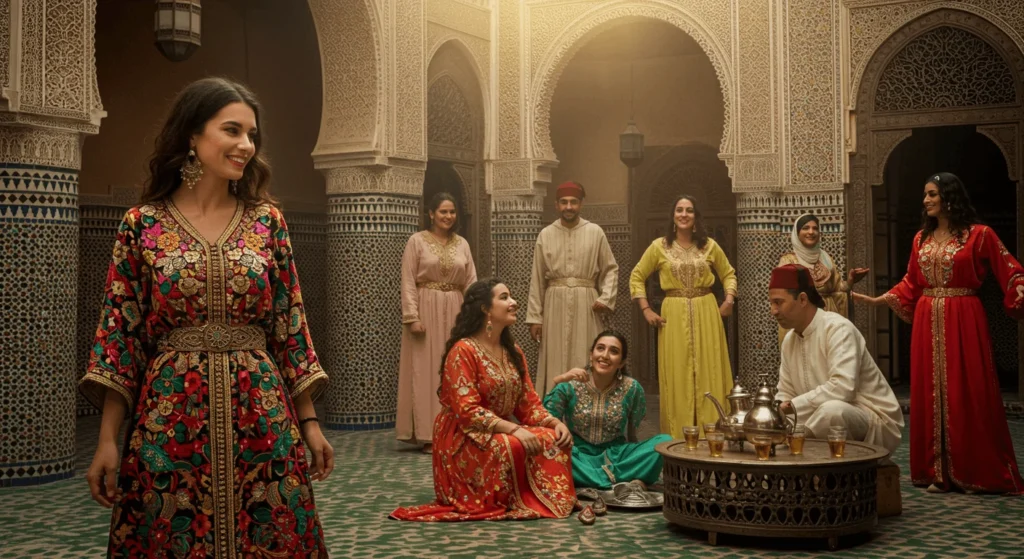Introduction
Morocco is a land of timeless charm, blending vibrant cultures, stunning landscapes, and rich history. If you’re planning a trip, scheduling a meeting, or connecting with loved ones, knowing Morocco’s current time is essential. Is it bright daytime or serene nighttime in this captivating country?
In this post, we’ll explore Morocco’s time zone and whether it observes daylight saving time. You’ll also discover how Morocco’s time compares to other countries worldwide. We’ll share live time updates for cities like Marrakesh and Casablanca. Plus, you’ll learn tips for planning your itinerary and understanding the role of time in Moroccan culture.
Stay with us to uncover the current time in Morocco and how it shapes daily life, travel, and traditions.
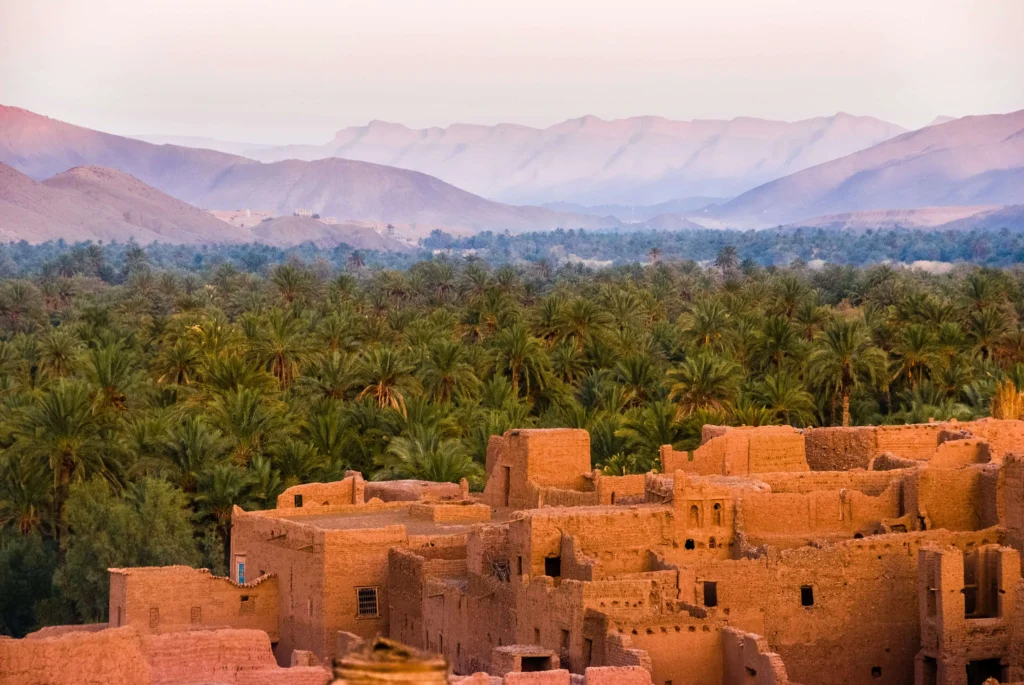
Understanding Morocco’s Time Zone
What time zone is Morocco in?
Morocco is located in the Greenwich Mean Time (GMT) zone, aligning with several Western European countries during standard time. GMT serves as the baseline for global timekeeping, making Morocco’s time zone easy to understand for travelers. This consistency simplifies international scheduling for business meetings and virtual calls.
For instance, when it’s 12:00 PM in Morocco, it’s the same time in the UK during the winter months. This alignment with GMT ensures a straightforward time conversion, especially for European visitors.
Does Morocco observe daylight saving time?
Yes, Morocco observes daylight saving time (DST) with a unique adjustment. From late March to late October, the country shifts to GMT+1. This means the clock moves forward by one hour to extend evening daylight. However, during Ramadan, Morocco temporarily suspends DST to align with religious practices. The clocks revert to GMT, accommodating the pre-dawn meal (Suhoor) and evening prayer schedules.
This switch has been a subject of debate, as some prefer the consistency of a single time zone. Despite this, the adjustment benefits energy conservation and allows businesses to operate in closer sync with European counterparts. For example, flights and conference calls from Morocco to Spain or France are easier to plan during DST.
How Morocco’s time zone affects travelers
Morocco’s time zone plays a significant role in shaping travel plans, meetings, and daily activities. For example, flights from New York to Casablanca require careful coordination due to the time difference. Morocco is five hours ahead of Eastern Standard Time (EST) during standard time and four hours ahead during daylight saving time.
Travelers should also note that Moroccan market hours and tour schedules often align with local prayer times. For instance, many businesses close briefly for the midday prayer (Dhuhr), which typically occurs between 12:00 PM and 2:00 PM.
Understanding these nuances helps travelers avoid missed flights, delays, or miscommunication with guides. By staying aware of the time zone, visitors can also plan activities like sunrise hot air balloon rides in Marrakesh or sunset views in Chefchaouen.
What Is the Current Time in Morocco?
Live time updates
Staying updated with Morocco’s current time is essential for travelers, business professionals, and virtual meeting participants. A reliable live clock widget provides real-time accuracy, especially during events like Ramadan or daylight saving time adjustments. Tools such as Time.is or WorldTimeBuddy can help you instantly check Morocco’s current time. Embedding these widgets on your phone or desktop ensures you never miss an important activity or event.
Major cities and their local time
While Morocco spans a single time zone, knowing the local time in major cities is still helpful. Rabat, the capital, is a focal point for government schedules and international affairs. Casablanca, as Morocco’s economic hub, follows regular business hours that align with international trade. Marrakesh caters to tourists who need precise timing for excursions or market visits. Fez, steeped in history, operates on a rhythm influenced by cultural traditions and prayer times.
Time updates during Ramadan or festivals
During Ramadan, Morocco temporarily reverts to GMT, adjusting the clock to align with fasting hours. This change impacts daily schedules, as many markets and cafes remain closed during the day but reopen after the evening call to prayer. Religious festivals like Eid al-Fitr and Eid al-Adha also bring unique timing adjustments. Prayer gatherings and community events often take priority, reshaping business hours and local routines.
How Morocco’s Time Differs From Other Countries
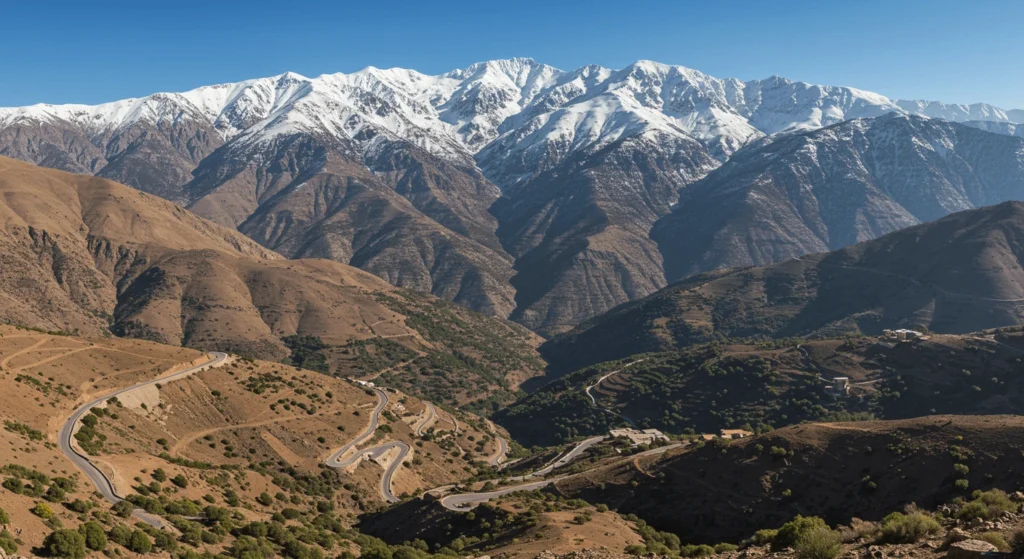
Time difference with Europe
Morocco shares a close time relationship with Europe, but differences arise due to daylight saving practices. During standard time (late October to late March), Morocco is on GMT, aligning with the UK. However, when Morocco observes daylight saving (GMT+1), it is one hour behind France and Spain, which operate on Central European Summer Time (CEST).
For example, if it’s 3:00 PM in Madrid or Paris, it’s 2:00 PM in Morocco during daylight saving. This difference impacts travelers and businesses planning meetings or connecting flights. Understanding this gap is crucial for arranging itineraries or coordinating activities with European partners.
Time difference with the United States
Morocco’s time differs significantly from the United States, varying between five and eight hours depending on the season. During standard time, Morocco is five hours ahead of Eastern Standard Time (EST) and eight hours ahead of Pacific Standard Time (PST).
For instance, when it’s 12:00 PM in Rabat, it’s 7:00 AM in New York and 4:00 AM in Los Angeles. During daylight saving, the difference narrows slightly, as Morocco shifts to GMT+1 while the US moves to daylight saving time.
These variations are essential for scheduling international calls, especially between Morocco and American cities. Professionals should confirm time zones carefully to avoid missed meetings or deadlines.
Key differences with other African countries
Morocco’s time differs from several African nations due to varying geographical placements and daylight saving practices. Neighboring North African countries like Tunisia generally share Morocco’s GMT+1 during daylight saving. However, sub-Saharan nations such as Ghana and Nigeria remain on GMT year-round.
For example, when it’s 1:00 PM in Rabat, it’s 1:00 PM in Accra, Ghana. In contrast, Nairobi, Kenya, which operates on East Africa Time (EAT), is three hours ahead. These differences highlight Morocco’s unique position at the crossroads of Europe, Africa, and the Middle East.
Understanding these variations is vital for tourists visiting multiple African countries or for businesses managing cross-continental operations.
Why Knowing the Time in Morocco Matters
Planning your travel itinerary
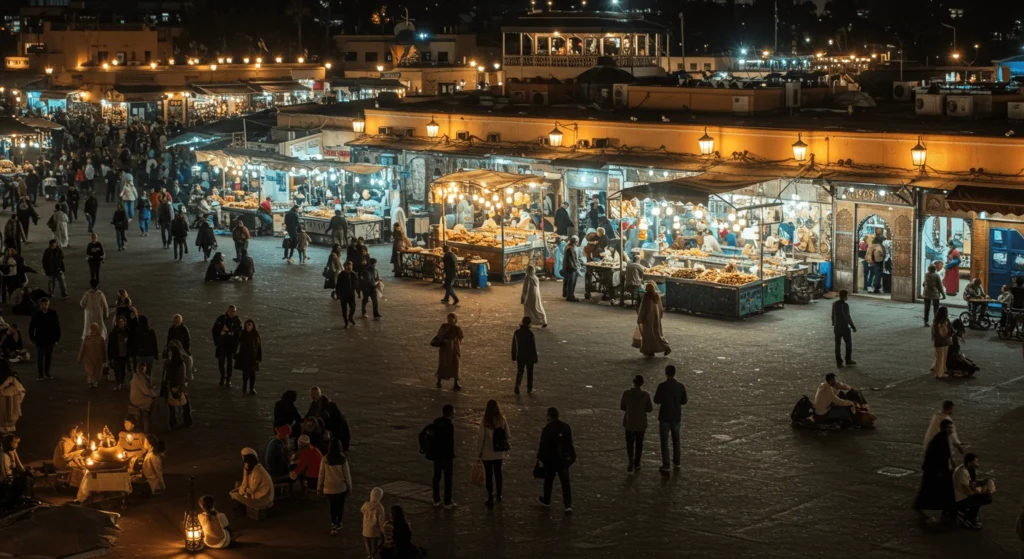
Understanding the time in Morocco is essential for creating a seamless travel itinerary. Many of the country’s attractions, such as the ancient ruins of Volubilis or the medinas of Fez and Marrakesh, operate during specific hours. Knowing the time ensures you arrive when these sites are open and avoid peak hours.
For instance, the famous Jemaa el-Fnaa square in Marrakesh comes alive in the evening. Arriving too early might leave you missing its vibrant nightlife. Similarly, many Moroccan souks (markets) operate until early evening, so planning a visit in the late afternoon helps you experience the bustling atmosphere while still catching shops open.
Tours and excursions, such as camel rides in the Sahara or day trips to Chefchaouen, also require precise scheduling. Missing a departure due to confusion about the local time can disrupt an entire day. By staying updated on Morocco’s time, travelers can enjoy every moment without stress.
Coordinating with friends or business contacts
For virtual meetings or calls with friends and colleagues in Morocco, knowing the correct time is crucial. Time differences, especially between Morocco and countries like the United States or Europe, can cause confusion if not carefully considered.
For example, scheduling a video call with someone in Rabat from London is straightforward during winter, as both are on GMT. However, during daylight saving, Morocco remains on GMT+1, while London shifts to GMT+1, creating a one-hour difference. Ensuring accurate coordination avoids missed appointments and strengthens professional or personal relationships.
In business, this becomes even more important when dealing with clients, arranging imports, or managing virtual conferences. A reliable time-checking method, such as world clock apps or meeting tools, can make this process smooth and professional.
Cultural significance of time in Morocco
Time in Morocco is deeply intertwined with its cultural and religious practices. The five daily prayers (Salah) are an integral part of daily life and are announced by the call to prayer (Adhan). These prayer times vary throughout the day, dictated by the sun’s position.
For instance, the midday Dhuhr prayer occurs around noon, while Maghrib aligns with sunset. Many businesses and markets briefly close during prayer times, especially in smaller towns. Travelers who respect this rhythm can better align their schedules with local customs.
Additionally, festivals like Ramadan highlight the cultural importance of time in Morocco. During this holy month, the day’s structure revolves around fasting from sunrise (Fajr) to sunset (Maghrib). Iftar meals, shared after sunset, mark a moment of unity and celebration.
Understanding these time-based traditions enhances the travel experience by fostering deeper cultural respect and appreciation.
Frequently Asked Questions About Time in Morocco
Does Morocco switch to daylight saving time?
Yes, Morocco observes daylight saving time (DST) but follows a unique schedule compared to other countries. Since 2018, Morocco has adopted GMT+1 as its standard time year-round, except during Ramadan. During Ramadan, the clocks temporarily revert to GMT to accommodate fasting and prayer schedules, aligning better with traditional practices.
This adjustment ensures more practical timings for Suhoor (pre-dawn meal) and Iftar (breaking the fast). For example, during Ramadan, the earlier sunrise makes pre-dawn prayers easier to manage, while the adjusted sunset ensures timely Iftar gatherings.
While most countries transition into or out of daylight saving seasonally, Morocco’s approach is more situational, tied to cultural and religious needs. Travelers should double-check the current time during Ramadan to avoid confusion, as this shift can impact flights, appointments, and events.
What’s the best way to check the current time in Morocco?
For real-time accuracy, reliable sources are essential to track Morocco’s current time. World clock apps, such as Time.is or WorldTimeBuddy, provide up-to-date information and adjust for daylight saving shifts or Ramadan changes. Most smartphones and smartwatches also automatically update to reflect Morocco’s time zone when you arrive.
Embedded widgets on travel blogs or official tourism sites can also offer live time updates. For example, the Moroccan National Tourism Office often displays the current time on its website to help travelers stay informed.
Additionally, consider adding Morocco’s time zone to your phone’s world clock feature. This simple tool allows you to quickly compare local time with other countries, ensuring effortless scheduling for calls, flights, or virtual meetings.
How do prayer times influence daily life in Morocco?
Prayer times in Morocco play a significant role in shaping the daily routines of locals and businesses. Muslims in Morocco observe five daily prayers, and the timing is based on the sun’s position. These include Fajr (pre-dawn), Dhuhr (midday), Asr (afternoon), Maghrib (sunset), and Isha (evening).
The call to prayer, or Adhan, is announced from mosques and signals a pause in many activities. For instance, during Dhuhr, shops and markets in smaller towns may close briefly, allowing people to perform their prayers. Restaurants and cafes often adjust their operations to accommodate prayer times, especially during Ramadan when Iftar is served immediately after sunset.
Travelers should keep these timings in mind when planning visits to markets, dining out, or booking tours. Respecting these customs not only enhances cultural immersion but also ensures smoother interactions with locals and businesses.
Conclusion
Understanding the current time in Morocco is essential for making the most of your travel experience. Whether you’re exploring vibrant markets, planning a business call, or participating in cultural events, accurate timekeeping ensures smooth coordination and meaningful interactions.
By knowing Morocco’s unique approach to daylight saving time and prayer schedules, you can avoid unnecessary disruptions. For example, travelers who plan around market hours or prayer times often find their experiences more rewarding. Additionally, businesses can benefit from seamless scheduling when they align with Morocco’s time zone.
Cultural immersion is another vital aspect. Morocco’s rich traditions are deeply tied to its daily rhythm, from the bustling souks of Marrakesh to the serene moments of prayer across Fez. Being aware of these time-based customs allows you to connect with locals more authentically, enriching your visit in countless ways.
In summary, staying informed about Morocco’s time not only helps with practical planning but also fosters a deeper appreciation of the country’s culture and traditions.
Call-to-Action
If you’ve found this guide helpful, share it with fellow travelers, friends, or colleagues who might benefit from understanding Morocco’s time. Bookmark this page for quick access during your trip, ensuring you’re always on schedule.
For future references, consider exploring our blog for more detailed travel tips, cultural insights, and time-related advice. From planning itineraries to learning about Moroccan customs, we’re here to help you make the most of your adventure.
Feel free to leave a comment below with your experiences or questions about Morocco’s time zone. We’d love to hear your stories and offer further guidance. Let’s stay connected and ensure your journey to Morocco is nothing short of extraordinary!
